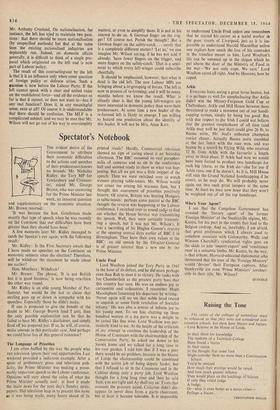Uncle Fred Lord Woolton joined the Tory Party in 1945
in the hour of its defeat, and he did more perhaps even than Rab to steer it to victory. He ranks with Joe Chamberlain as the greatest party boss that this country has seen. He was an endless joy to cartoonists and columnists. I remember Hugh Massingham lamenting his departure by writing: 'Never again will we see that noble head reared in anguish at some fresh revelation of Socialist infamy.' He was also a source of infinite joy to his young men. To see him chatting up three hundred women at a tea party was a delight to be tasted like fine wine. Lord Woolton was par- ticularly kind to me. At the height of the criticism of my attempt to combine the leadership of the House of Commons with the chairmanship of the Conservative Party, he asked me down to his Sussex home and we talked for a long time in his rose garden. I told him that if I was a peer there would be no problem, because in the House of Lords the chairmanship could be combined with the active job of being deputy leader, but that I refused to sit in the Commons and in the Cabinet doing only a party job. Lord Woolton thought for a long long time and then he said 'lain, you are right and Ay shall say so.' From that moment the pressure eased. Criticism didn't dis- appear (it never does from a party chairman), but at least it became tolerable. It is impossible
to understand Uncle'Fred unless 'one remembers that he started his career as a social worker in the poor streets of Liverpool, just as it is im- possible to understand Harold Macmillan unless one re9lises how much the loss of his comrades in the trenches meant to him. Lord Woolton's life can be summed up in the slogan which he put above the door of the Ministry of Food in the war—We not only cope. We care.' Lord Woolton cared all right. And by Heavens, how he coped.




























 Previous page
Previous page